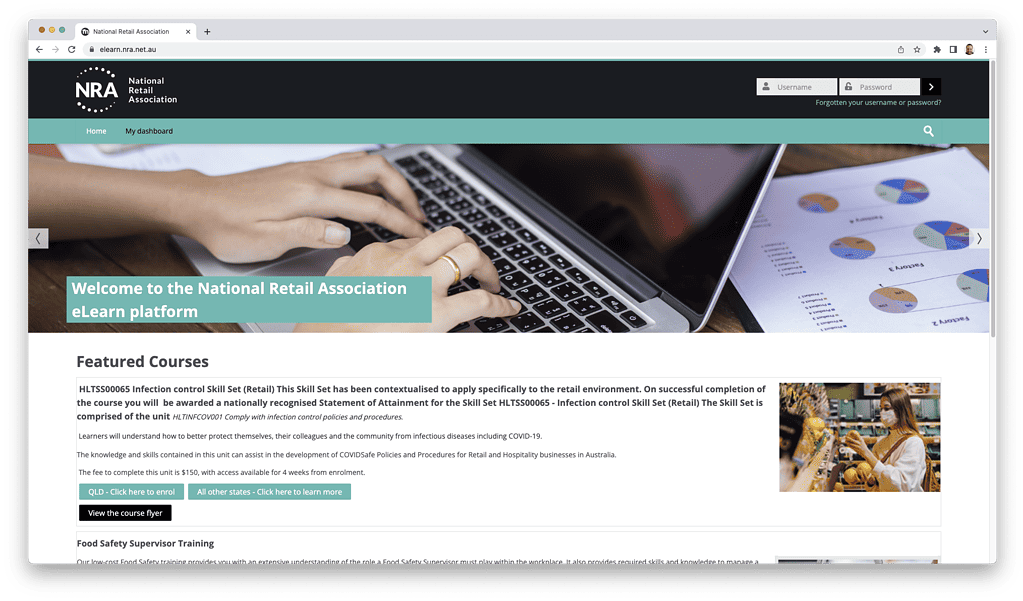The Transformative Impact of LMS on Retail
Learning management systems (LMS) have changed the way retail businesses approach staff training and development. In a fast-paced, competitive industry that is constantly evolving, keeping ahead of trends and maintaining a well-trained workforce is crucial. Implementing an LMS allows retailers to streamline staff training, improve efficiency, and foster a positive learning environment.
Key Takeaways
- Streamlining staff training: An LMS enables retail businesses to deliver diverse training courses, reducing time and cost while ensuring up-to-date information and resources.
- Building company culture: An LMS can serve as a company intranet, fostering team discussions and nurturing a positive company culture for improved efficiency and employee satisfaction.
Streamlining Retail Staff Training with LMS
With an LMS, retail companies can deliver a diverse array of training courses. These courses can be designed to address the unique needs of retail businesses. Using an LMS reduces the time and cost associated with traditional training methods while ensuring staff have access to up-to-date information and resources.
| Key Training Areas | Example |
| Technology Skills | Provide training on using specific retail technology systems and software |
| Sales Techniques | Train employees on effective sales strategies and tactics |
| Customer Relationship Management | Teach employees how to build and maintain strong customer relationships |
| Teamwork and Collaboration | Foster a collaborative work environment and effective team dynamics |
| Product Knowledge | Equip employees with comprehensive knowledge of the products they sell |
| Health and Safety | Ensure staff know how to maintain a safe working environment |
| Visual Merchandising | Teach staff how to create appealing product displays |
| Customer Service Skills | Develop skills to provide excellent customer service |
| Teach employees how to upsell products to customers effectively | Enhance problem-solving abilities to address customer issues |
| Loss Prevention | Prevent theft and minimise losses through proper security measures |
| Continuity Training | Maintain consistent customer service standards |
| Induction Training | Acclimate new employees to company culture and procedures |
| Merchandise Planning | Train employees on planning and organising merchandise assortments |
| E-commerce Training | Equip employees with knowledge of online retailing and e-commerce platforms |
| Inventory Management | Teach employees how to track and manage inventory efficiently |
| Compliance Training | Keep employees informed of industry regulations |
| Time Management | Help employees manage their time effectively |
| Leadership Development | Provide training for employees to develop leadership skills |
| Product Upselling | Teach employees how to effectively upsell products to customers |
| Effective Communication | Improve communication skills among employees |
Examples of how retail outlets use learning management systems:
- Online Training Delivery: Retail outlets utilise learning management systems (LMS) to deliver training materials and courses to their employees in a convenient and accessible manner. LMS platforms enable retailers to create, manage, and distribute training content, including videos, presentations, and quizzes. Employees can access these resources at their own pace, allowing them to learn on their schedule.
- Tracking Employee Progress: Learning management systems help retail outlets track and monitor employee progress during training programs. LMS platforms provide insights into completed courses, assessment scores, and overall training performance. This information enables managers to identify areas where additional support or training may be required.
- Certification Management: LMS platforms assist retail outlets in managing certifications and compliance training. These systems can track certification expirations, automate renewal reminders, and generate reports for compliance audits. Retailers can ensure that employees stay up to date with necessary certifications and regulatory requirements.
- Performance Support: Learning management systems can serve as a centralised repository of reference materials and job aids. Retail outlets can use LMS platforms to provide employees with quick access to training resources, such as product knowledge guides, sales techniques, and customer service best practices. This support enhances employees’ ability to perform their job effectively and provides them with on-the-job assistance when needed.
- Gamification and Engagement: Some retail outlets leverage learning management systems to gamify training experiences and increase employee engagement. LMS platforms offer features like badges, leaderboards, and interactive elements that make the learning process more enjoyable and motivating. By incorporating gamification elements into training, retail outlets can boost participation and knowledge retention among their employees.
Beyond Training: LMS as a Company Intranet and Culture Builder
An LMS can also serve as a valuable company intranet, providing a platform for team discussions, sharing resources, and nurturing positive company culture. By fostering a connected, well-rounded team, businesses can improve efficiency, and employee satisfaction, and achieve long-term success.

Overcoming LMS Implementation Challenges in Retail
Introducing an LMS to your retail business may present challenges, such as engaging your team, ensuring accessibility, and providing user-friendly functionality. Careful planning and the right support can help overcome these obstacles and facilitate a smooth LMS implementation.
Harnessing the Power of an LMS for Cost Reduction and Improved Efficiency
By streamlining staff training, an LMS can significantly reduce costs associated with traditional methods. In addition, better-trained employees contribute to improved efficiency, ultimately leading to increased profit margins.
Fostering a Positive Learning Environment with Retail LMS Solutions
A well-implemented LMS not only enhances staff training but also creates a supportive learning environment. Retail businesses can thrive in a competitive marketplace by promoting professional growth and fostering a team-oriented culture.
Adopting a learning management system for your retail business can lead to transformative growth, streamlining staff training, and supporting effective learning. Embrace the power of an LMS to reduce costs, improve efficiency, and foster a positive learning environment for your employees.
Discover the best retail LMS solutions for your business by contacting us today!
